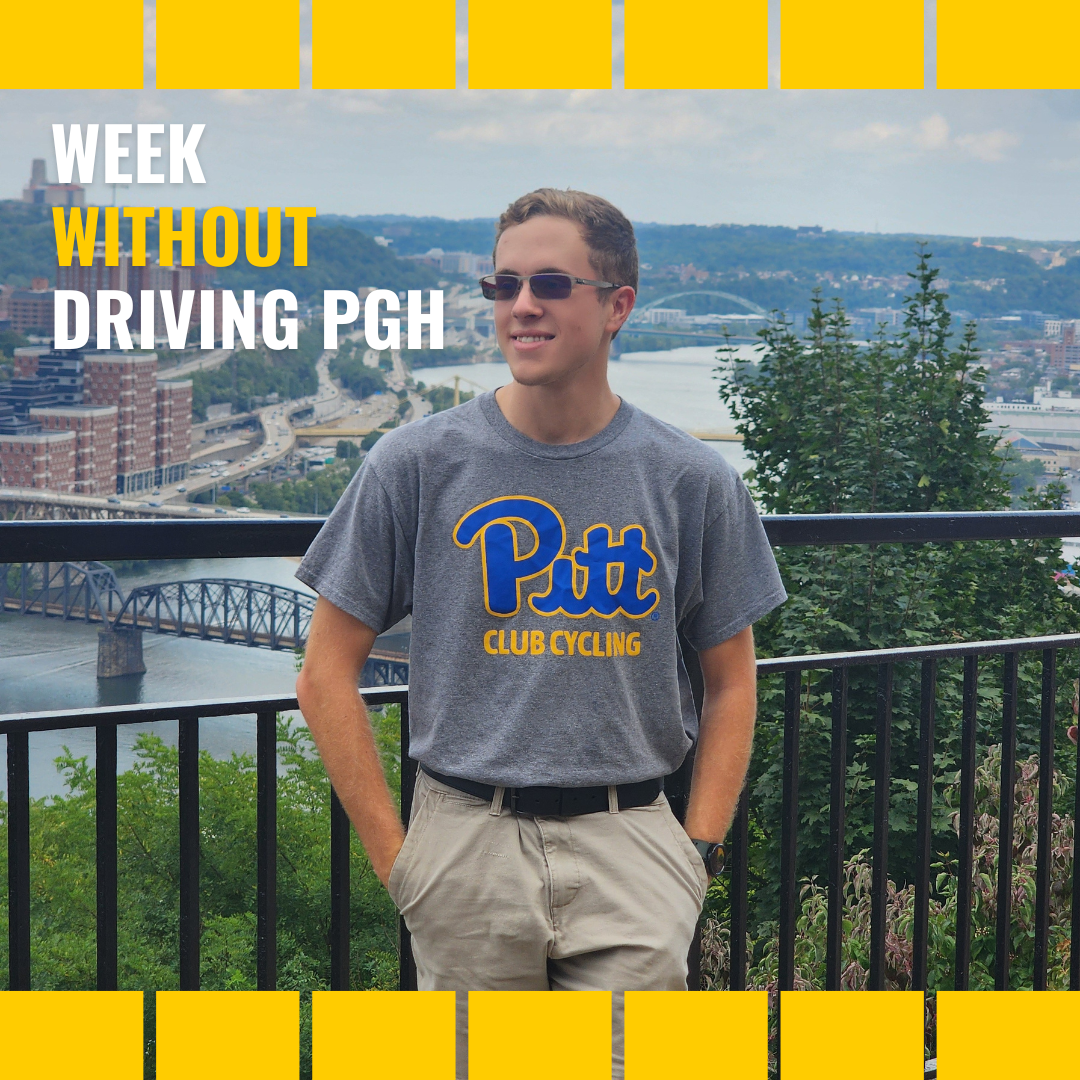
Week Without Driving PGH uplifts the stories of nondrivers and invites us all to advocate for improved mobility options. Together, we can win better access for all!
“I do not drive because of the cost of owning and operating a car. With rent, tuition, and other financial obligations, I would simply be unable to afford a car. And I enjoy getting outside on my commute, whether walking a block to my bus stop or biking all the way to Pitt. It is a great way to start the day!”
Jacob Evangelista
Whether we live in a suburban town or city neighborhood, everyone in Allegheny County deserves safe, reliable, dignified access to the places we need to go. I’m inviting you – whether you are an individual, organization representative, or elected official- to take the pledge to experience life as a non-driver, and participate in the national Week without Driving from Monday, Sept 30th – Sunday Oct 6th 2024!
The Week without Driving is a national week of action in which we uplift the experience of non-drivers in our communities, and highlight some of the barriers and challenges that we face getting where we need to go without being able to drive or afford a car. As youth, people with disabilities, older adults, people who cannot afford cars or gas- we non-drivers represent nearly a third of the population.
The #WeekWithoutDriving challenge was launched in 2021 by Anna Zivarts at Disability Rights Washington and is now a national initiative, led by America Walks and the National Campaign for Transit Justice. I’m proud to join this movement to raise awareness for greater mobility needs in every community, and I’m a member of Access Mob, a Disability Justice organization which is one of the four co-hosts for Week Without Driving PGH.
My name is Jacob Evangelista and I invite you to join me for the Week Without Driving PGH to advocate for improved mobility for all!
I have biked in 11 states across the Northeast and DC, and I have found that Pittsburgh is a very manageable city to get around. When I lived in Greater Boston, I lived in a similarly dense neighborhood, but it was 11 mi north of downtown, here in Pittsburgh, I live in Squirrel Hill, which is under 5 mi from downtown; Pittsburgh’s small size makes it much easier to get around using a bike. I was commuting over an hour each way in Boston, and that was expected, here in Pittsburgh it takes 20-30 min to get downtown. It makes it much easier for me to get a job in any part of the city. I would not personally mind riding over 10 mi each way to work every day, as I did in Boston, but that is just not doable for most people. Pittsburgh’s size makes it much easier for people to start riding a bike as you will not be nearly as sweaty or tired by the time you get to work.
While Pittsburgh’s cycling infrastructure could always use some work, it is much better than many other cities. Building a bike lane on many of Pittsburgh’s streets is unnecessary due to slow speeds, skinny lanes, and low traffic. The most significant barrier to Pittsburgh cycling, in my opinion, is the drivers. I always thought Boston’s drivers were terrible, but that was before I moved to Pittsburgh; now I realize how much of an impact a city’s drivers make on its bikeability. PA needs to implement more driver’s education on driving around cyclists and increase traffic law enforcement for drivers. A 4-ft passing law is only as good as a driver that knows it exists and follows it.
Until recently, I did not have a driver’s license, as I failed the MA road test twice. Living without a license in Greater Boston and Pittsburgh highlighted the importance of looking at people who do not drive. Getting around Pittsburgh showed me how Public Transportation and Cycling are complementary to each other; most cyclists take the bus at least once in a while.
Now that I have a driver’s license, I do not drive because of the cost of owning and operating a car. With rent, tuition, and other financial obligations, I could simply not afford a car. I also would not even want to drive a car in Pittsburgh; after driving in this city once, I do not want to drive around here. I also enjoy getting outside on my commute, whether that just be walking a block to my bus stop or riding all the way to Pitt, I have loved getting outside and getting some exercise; it is a great way to start the day!
The main issues I face have to do with motorists not following the traffic laws already in place. If the police were to enforce speeding, running red lights, the 4-ft passing law, and stopping for pedestrians, I would feel much more comfortable bringing new cyclists onto Pittsburgh’s roads.
Increased cycling infrastructure and traffic calming would also help make Pittsburgh’s streets feel safe, welcoming, and accessible for all road users. The city should model neighborhood roads more after Ellsworth Ave in Shadyside; even though that project faced pushback, it is an accepted part of driving through Shadyside, and Ellsworth is a great way to get around for people on bikes, as well as including bus riders on the 75.
Not everyone has access to a car, so it is important, especially for decision-makers, to see how other members of their community get around. If someone is forced to take the bus for a week, they will be more sympathetic when their co-worker is late because the bus never showed up. If someone is forced to ride a bike, they may be more sympathetic and give more space to a cyclist on the road the next time they drive. It is all about being more understanding to your neighbor.
- Jacob Evangelista